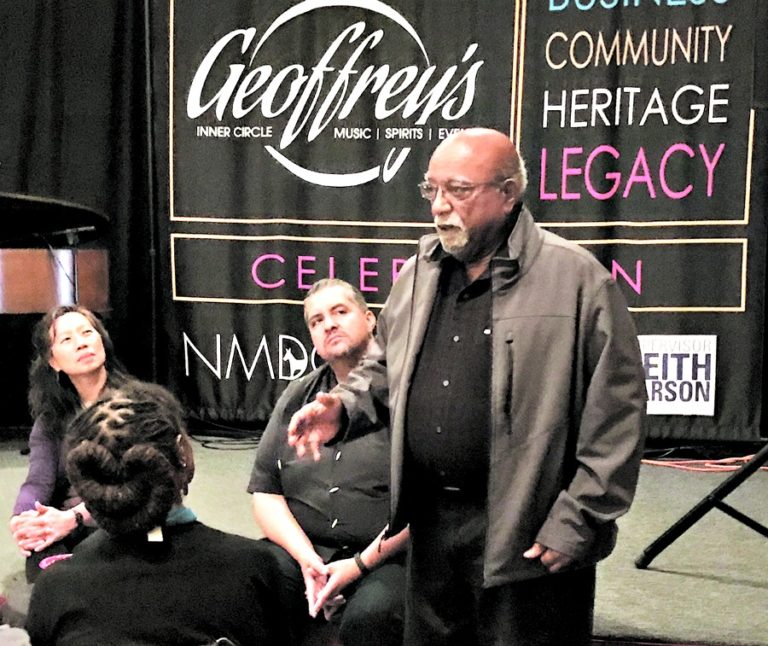Post Salon Calls for Moratorium on Sale of Public Land as Market Rate Building Boom Sweeps City
May 4, 2018
Posted in Affordable Housing, Community, Equal Rights/Equity, Post Salon, Responsive Government

Mayor and City Administration push property sales without transparency or community involvement. Speakers at the Post Salon included (L to R): Margaretta Lin, Councilmember Abel Guillén, Post Publisher Paul Cobb (moderator) and Vanessa Riles (Back to camera). Photo by Ken Epstein.
By Ken Epstein
This past week’s Oakland Post Salon examined a critical issue that underlies many of Oakland’s recurring conflicts: the mayor and administration are rapidly selling to developers the city’s limited numbers of publically owned properties—paid for by taxpayers—without regard to the impact on communities or the needs and wishes of local residents.
Rather than allowing Mayor Libby Schaaf and the City Administrator to continue with their version of Ronald Reagan’s “trickle-down economics,” promising that someday a few of the benefits will reach the people, the community can ask the City Council to stop selling city-owned parcels as investments for market-rate housing and high-priced office buildings for the wealthy, according to speakers at the Post Salon.

Instead, the city can use public lands for community needs such as grocery stores, playgrounds, affordable housing, solutions to homelessness and office space for the nonprofits that serve the community, the speakers said The Salon agreed unanimously at its April 29 meeting to call on the City Council to pass a moratorium on sale of public land, except for real affordable housing, until the council passes a strong policy requiring that 100 percent of city-owned land should be utilized for community needs, prioritizing community land trusts that promote long-term leases instead of sale of public land.
In addition, the moratorium calls for a process that requires the mayor and administration to be fully transparent in its dealings with the public, involving affected communities in decisions on how to use the land. In addition, decisions should be made in public rather than secretly behind closed doors, as so often happens at present.
The panel of speakers at the Salon, which was held at Geoffrey’s Inner Circle in downtown Oakland, were Vanessa Riles of the Citywide Anti-Displacement Network, City Councilmember Abel Guillén and Margaretta Lin, former city staffer and executive director of the Dellums Institute for Social Justice.
“Oakland is the epicenter for the racial displacement crisis,” said Margaretta Lin, pointing out that rents in the city have increased 63 percent since 2014, causing widespread evictions and an “explosion of homelessness.”
An answer to this crisis is within the city’s grasp, if it has the political will, she said. Citing reports, she said that Oakland has 2,400 publicly owned land parcels, 50 of which have been earmarked as suitable for affordable housing and capable of accommodating over 7,300 new housing units.
“Oakland is becoming the next San Francisco,” said Lin, adding that affordable housing advocates across the Bay tell her the lesson they have learned is that Oaklanders should “hold down land.”
However, she said, “We have a mayor and city administration that is not friendly to this.”
At present, “We have this policy vacuum,” she said. “The city does not have a policy.”
Citing studies, Lin said that as of December 2017, Oakland has 20,000 market rate housing units under construction or in the pipeline, while there are less than 1,500 affordable units that are being built, she said.
Truly affordable housing would be available to the majority of Oakland renters, who have an average annual income of $36,000 a year for a family of four, she said. But the units that the city labels as affordable often require family incomes of as much as $100,000 a year or more.
Councilmember Guillén in his remarks pointed out that California has one of the highest numbers of homeless in the country, 140,000 people statewide, “and it’s getting worse.”
“The city has not had a clear process on how we deal with public land,” which has allowed “sweetheart deals” with individual developers, he said.
“Our process is not transparent at all,” Guillén continued, adding that “right now we are not building enough affordable housing. What we have right now is not good. The number is not good.”
Rather than build affordable housing and market-rate housing in separate locations, all new construction should include affordable housing, he said.
“Every project should have at least 15 percent affordable housing, if not more,” he said.
Vanessa Riles said that those at the table when decisions on public land are made must be indigenous people, low-income residents and Black people—those who have been experiencing the violence of displacement since the beginning.
“Public land should be used for public good. Period. The decisions should be made by the public and the most vulnerable populations, the people who live in the places that are being developed.”
She called for rejecting present policies with “loop holes,” which allow the city administration to do anything it wants.
“Staff has been able to go forward because (existing) policy has not been strong enough. I want the city to actually mitigate displacement and homelessness in Oakland,” she said.
There are many different organizations in the city with different ideas and priorities about what should be done, Riles continued. She said she supports “deep levels of community engagement, (the formation) of a community advisory committee and prioritizing the public good: maybe it’s a grocery store, a community garden or low-cost clinic.”
The City Council has the authority to stand up to the mayor and the administration, she said. “It’s question of political will.”
Community members are backing the proposal for a moratorium on the sale of public lands at the City Council’s Rules and Legislation Committee, Thursday, May 10, 10:45 a.m., in Oakland City Council Chambers.